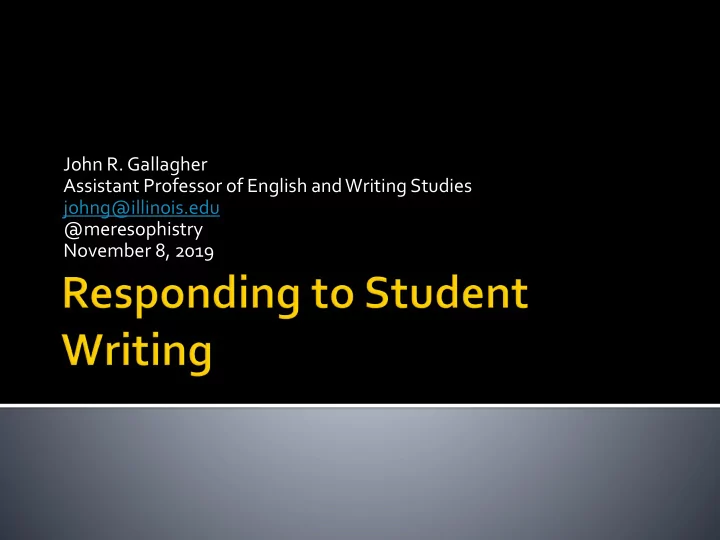

John R. Gallagher Assistant Professor of English and Writing Studies johng@illinois.edu @meresophistry November 8, 2019
To foreground the concept of purpose To introduce & practice effective response To share scalable response strategies
❑ To improve the quality or accuracy of the text ❑ To improve students ’ understanding of the material ❑ To improve students’ ability to write ❑ To build an instructional relationship with the student and/or the class. ❑ To justify the grade Adapted from WAC, Prior
Extensive conversations with the course advisor/instructor (synchronize purpose)
Clarify whether you are supposed to be grading (assessment) or offering feedback (for improvement)
Determine the sequence of writing assignments before the course begins in order to anticipate future assignments in your response
What would you do with this response as a student? (see handout)
Comprehensive line ▪ editing & error correction Responses associated ▪ with final drafts & grades
Selective, global ▪ feedback Responses to in-progress ▪ writing ▪ Student reflection on how comments were addressed
Begin with positive feedback. ▪ Include ≤ 3 high -priority comments, each illustrated ▪ with a specific example from the text. Focus on content and writing process rather than ▪ grammar. ▪ Identify patterns. ▪ Make an explicit connection to the next revision or assignment. One key source: Dana Ferris
Remember:
Begin with positive feedback. ▪ Include ≤ 3 high -priority comments, each illustrated ▪ with a specific example from the text. Focus on content and writing process rather than ▪ grammar. ▪ Identify patterns. ▪ Make an explicit connection to the next revision or assignment.
Let students know that they need to get help. If you are able to identify specific areas for improvement, tell them what those are. If editorial assistance is allowed for class assignments, let them know about that option. Suggest resources, such as Writers’ Workshop.
Try the minimal marking approach. ▪ Rather than correcting, or even marking, specific mistakes, note how many mistakes are in a given line or paragraph. ▪ Give the students the responsibility of finding and correcting them. See Haswell 1983
Mark up one paragraph, explain that similar issues are present throughout, and ask them to apply throughout. See Haswell 1983
No response Self-evaluations Peer response Rolling response Collective response
In some cases, no response may be needed. Examples: ▪ the issue is judged to be low priority, ▪ the purpose of the writing is self-reflection, ▪ perhaps for some writing-to-learn texts, or ▪ there is no next draft or next assignment.
Provide purpose-driven instructions. Be explicit about the benefits. Evaluate this paragraph based on the 5 principles discussed in class this week. What strategies did I use before and Identify 1-2 important points to address during writing to represent my ideas? in your next revision. Why are these strategies effective? Improve this text Develop an effective writing Learn to give yourself feedback process
Students Students write Feedback texts submit a feedback are assessed, Students are solutions to provided with text to respond rather than the math-based solutions to to peers solution to engineering problems. solution math-based problem set. submissions. problem. “Students were asked to provide feedback to the solutions written by their peers. …it was important for us that the students did not only pay attention to the correctness of the solution, but also considered the way the solution was presented …If they found mistakes, students were expected not only to name them but also to describe the error in reasoning and to give clues on how to find the correct answer …we offered support in the form of guiding questions…[to help] students structure their feedback and focus on the important points” Stahlberg, Mosler, & Schlüter. 2016
Vary the focus of the response over time. ▪ Minimal marking on different paragraphs in different drafts ▪ Grading rubrics that focus on different sections of a lab report over the semester ▪ Providing detailed feedback on the first section that is below an acceptable standard. (e.g. Morgan, Fraga, & Macauley. 2011)
Responding to writing en masse. ▪ Addresses the most common strengths & problems with the whole class ▪ Can be paired with codes giving individual feedback ▪ Side benefit – Common problems may suggest ways to improve structure or communication of the assignment.
1) What is one thing you heard today that you think would be useful in your class? 2) What concerns do you have about applying it?
Concerns …
Start from your purpose. Invest your time where it will have the most benefit – usually while the writing is in progress. Work to have students assume more responsibility, so that they learn the process. Incorporate a variety of responders & approaches. Consider the context. Sometimes the most appropriate response to problems will be to change how you approach the assignment. Adapted from WAC, Prior
For the first lab, instead of writing a lab report, give the students samples and have them grade those examples according to the rubric provided. Provide collective feedback by sharing how course staff would grade those reports. Discuss expectations & have students reflect on how to apply what they have learned. Adapted from B. Sturm, U Kansas
I keep an ongoing bullet point list of comments I often give (for copy and pasting) If a paper is “bad,” I try to identify what the writer is doing wrong (was it rushed? Language barriers?) and ask students if my hunch is right I try to remember students are trying to get better at writing (it takes a long time)
Recommend
More recommend